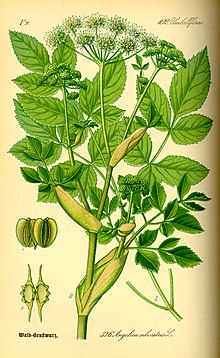

(Angelica archangelica)
Parts used: root and leaf
Properties: carminative, diaphoretic, emenagogue, stimulant, alternative, expectorant, tonic.
What if affects: Circulation, heart, stomach, intestines,and lungs.
Preparation and amount:
Infusion(leaf): steep herb 15 min. Drink 1-2 0z. 3x daily
Decoration(root): simmer 10-15 min. Drink 1-2 oz. 3x daily
Tincture: take 5-15 drops 3x daily
Fluid extract: take 1/2- 1 tsp. 3x daily.
Powder: take 3-5 #0(15-30 grains) 3x daily.
Purpose:
Internally, angelica tea improves circulation ang warms the body. It is one of the best herbs to use for coldness in the winter. Its regular use will create a distaste for alcoholic drinks.
Angelica tea stimulates appetite, relieves flatulence, heartburn, and muscle spasms(including spasms of the stomach and bowels), and stimulates kidney action. It is useful for all sorts of stomach and intestinal difficulties, including ulcers, vomiting, and stomach and cramps. It can also be used for intermittent fever, nervous headache, colic, and general weakness.It is good herb to add to treatments for lung diseases, coughs, colds, fevers, pleurisy, and all lung diseases.
Externally, angelica tea is useful in the treatment of rheumatism, with a pint of boiled water poured over an oz. of the bruised root. The usual dose is 2-3 tbsp.3x daily.
Note: Gather the rootstock and roots in the second year
Warning: Used inlarge doses, angelica has a negative effect on blood preasure, heart action, and respiration. It is a strong emmenagogue and should not be taken by pregnant women. Diabetics should avoid using angelica as it tends to increase the sugar in the blood. Be cautious when harvesting the plant in the wild, because it can be confuse with European water hemlock, which is deadly poison. There is a second herb called"angelica" (Angelica sylvestris); but it is different herb, with different properties, and used far less by herbalists.
No comments:
Post a Comment